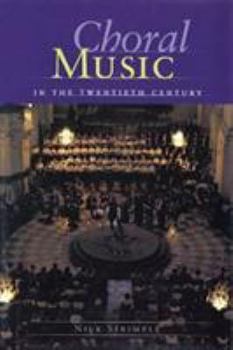Choral Music in the Twentieth Century: Hardcover
(Amadeus). Musical works for chorus are among the great masterpieces of 20th-century art. This guide, the first truly comprehensive volume on the choral music of the last century, covers the... This description may be from another edition of this product.
Format:Hardcover
Language:English
ISBN:1574670743
ISBN13:9781574670745
Release Date:March 2003
Publisher:Amadeus Press
Length:392 Pages
Weight:1.88 lbs.
Dimensions:9.5" x 1.3" x 6.5"
Customer Reviews
2 ratings
Every choral director needs this book (with a few caveats)
Published by Thriftbooks.com User , 15 years ago
Firstly, it needs to be said: As far as I know, this is the best book out there for what it's trying to do. It's a truly encyclopedic look at choral music all around the world in the 20th century. It does a beautiful job of including brief summary information about all the major choral writers, and details about the major works. As I read it, I kept thinking about how long it would take just to locate and listen to/play through all the works listed in the book. It would be the work of a lifetime if you were doing anything else with your life. Further, because it is so encyclopedic, I think it will wind up being the source for countless program notes and research papers. And this is why my next points are, I think, especially important. 1) This book has a lot of opinion in it. That's one major thing in its favor. A book listing only the major composers' major teachers and major works with dates and locations of premieres would be dry as dirt. Strimple isn't afraid to call inferior work inferior, to dismiss certain composers' entire output, and to consign composers who are currently popular to the dustbin of history. (his comments on Rutter are shockingly dismissive, and, I think, accurate)Opinion in a reference book is scary if you expect it to be even-handed, which this book certainly isn't. The author makes no attempt to hide his personal tastes. 2) Like any book of its kind, this book is not going to have an infallible record of the last 10 years of the century. First published in 2002, it does what it must: lists with very little comment a string of prominent writers from the '90s in all the geographic areas it covers. But in 20 or 30 years, it will read like Copland's 1969 book "The New Music" does now. Some great assessments and some 'who?' moments. 3) As one might expect, the book weighs heavily toward serious 'concert music' as opposed to 'popular choral music'. He is particularly dismissive of American Evangelical music, and he uses a quote from Mahler to bolster his argument that form should be the equal of function in music, although one might ask what difference Mahler's opinion makes in a genre he showed no interest in. He also seems dismissive of popularizing and simplifying elements in church music that have worked their way into the music of educational institutions. Backhanded compliments to Natalie Sleeth and withering comparisons of John W. Peterson's cantatas with those of Bach seem a little over the top. After all, neither of them aspire to the same aesthetic Bach did, and the times have changed considerably since 1750. There is also an argument to be made that MOST church music throughout history has been functional, of middling quality, and without lasting value, although to hear Strimple talk about it, the 1960s brought about a precipitous decline of a previously high standard of church music. I think Bach was as much an aberration in his own day as he is now, and hum-drum masses and passions we're continually unear
very nice resource
Published by Thriftbooks.com User , 22 years ago
Very good library book to have for reference re recent choral music. Lots of discussion about almost all important 20th C. works. I highly recommend it.





